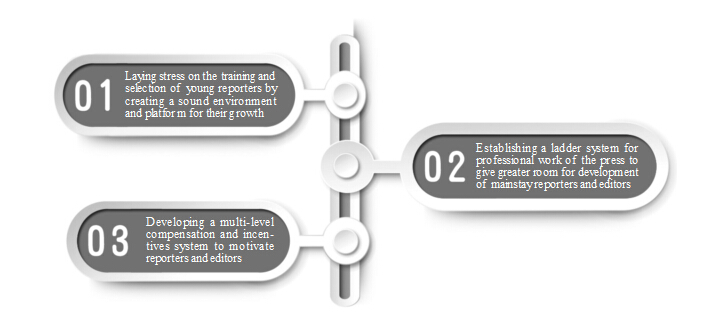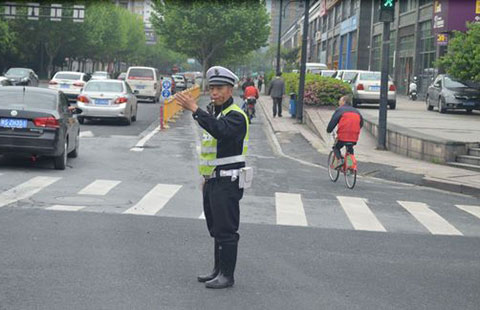Full text: Development of china's news media in 2015
(Xinhua) Updated: 2016-04-29 11:20

1. Laying stress on the training and selection of young reporters by creating a sound environment and platform for their growth. To help young reporters improve their competence and professional skills and advance their career, many of China's media organizations have established normalized systems for the training and selection of young talents. The Xinhua News Agency has implemented and improved the system that the young employees fresh from college go and temper themselves in the branch offices of the agency to gain necessary professional experience; established the system that its reporters and editors go to the grassroots to access firsthand information; encouraged job rotation of its young editors and reports at the headquarters and domestic branches by trying out the practice of "dual secondments"; promoting throughout the agency the "system of mentors for young employees"; and promoted outstanding young professionals to senior professional and technical positions by breaking the established rule under the precondition that the appraisal for professional titles and assignment of technical jobs are separated. In 2015, CCTV launched a program known as "Training Program for Celebrities," including the "Training Program for Young Talents" in which 300 promising young workers every two years receive systemic training so as to turn them into leaders in their areas of expertise. As of 2010, a number of media in Guangdong Province have selected a number of aspiring young reporters and editors to go and work in the province's township, villages and urban communities to acquire experience working in the grassroots and to include their performance in their temporary posts at the grassroots as a condition of their promotion.
2. Establishing a ladder system for professional work of the press to give grater room for development of mainstay reporters and editors. Many media organizations in China adopt a category-specific hierarchy system to provide their staff with more channels and room of development. Xinhua News Agency, for example, has tried out with the establishment of the title of "Chief Journalist of Xinhua News Agency" as the highest technical position of the agency and the "chief journalists (reporters) or editors" of the various departments, units and branch offices, put in place a system of hierarchical technical positions, and worked out an incentive and distribution policy compatible with the system of hierarchical technical positions by adopting rewards standards for "chief" and all other posts. China Education Press Agency has tailor-made a salary system comprising five tiers and 18 grades in line with the requirements of modern corporate system, and, by way of performance assessment, encourage more pay for more work and better pay for more outstanding work and allow the chief commentator, editor and reporter to get equal pay with the president, so as to arouse to the full the employees' enthusiasm and creativity.
Guangzhou Daily Group has 13 professional ranks, from trainee reporter to chief reporter and chief editor. The chief reporter earns a salary close to that of the Group's deputy editor-in-chief, and a senior reporter's salary is similar to a middle-level manager at the Group. The performance of the employees is evaluated every two years and the result of the evaluation serves as a major criterion to decide their rankings. Sichuan Daily Group's chief reporter and chief editor earn salaries the same as or even higher than that of the Group's president.
3. Developing a multi-level compensation and incentives system to motivate reporters and editors. Many of China's media have kept regularizing and adjusting their performance-based pay systems and incentives policies, establishing and improving incentives, establishing innovation project incentive mechanism to arouse the enthusiasm of reporters and editors. To appeal the high-end professionals urgently needed for their own development, some media have adopted special remuneration policies by referring to market standards, experimenting with annual salary system to retain talent and maximize productivity. At Xinhua, experts and core professionals are evaluated and managed according to their categories, and those who make outstanding contribution are rewarded with citations of merit and other awards. It also holds regular appraisals of agency-level experts, such as the Xinhua Top 10 Editors and Reporters.
The CCTV has established an annual innovation fund for employees, mainly to sponsor the network's innovation competitions and the innovation-related activities of its departments, and to reward the winners of such events. In 2014, Zhejiang Daily Group kicked off the "Star Project," for which the Group and its listed companies injected a fund of RMB30 million for the incubation of innovative projects. A total of 17 projects were screened for incubation support from the Group.
- Full text: Chronology of Human Rights Violations of the United States in 2015
- Full text of President Xi Jinping's speech at the Fourth Nuclear Security Summit
- Full text: Report on China's economic, social development plan
- Full Text: Report on the Work of the Government
- Full text of white paper on nuclear emergency response
- Xi: Talks key to resolving differences
- New law adopted on overseas NGOs
- Migrant population growth rate slows
- Investors eye Italian soccer giants
- Baidu signs agreement to reduce online IP infringement
- Global Snapshot
- Internet regulators shut down 1,046 illegal websites in Q1
- Even China's tech billionaires not safe from phone scams
- Home is where the heart is: Beijing car-hailing app drivers' journey
- China ranks No 1 in progress against child discrimination








